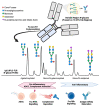IgG N-glycan Signatures as Potential Diagnostic and Prognostic Biomarkers
- PMID: 36980324
- PMCID: PMC10047871
- DOI: 10.3390/diagnostics13061016
IgG N-glycan Signatures as Potential Diagnostic and Prognostic Biomarkers
Abstract
IgG N-glycans are an emerging source of disease-specific biomarkers. Over the last decade, the continued development of glycomic databases and the evolution of glyco-analytic methods have resulted in increased throughput, resolution, and sensitivity. IgG N-glycans promote adaptive immune responses through antibody-dependent cellular cytotoxicity (ADCC) and complement activation to combat infection or cancer and promote autoimmunity. In addition to the functional assays, researchers are examining the ability of protein-specific glycosylation to serve as biomarkers of disease. This literature review demonstrates that IgG N-glycans can discriminate between healthy controls, autoimmune disease, infectious disease, and cancer with high sensitivity. The literature also indicates that the IgG glycosylation patterns vary across disease state, thereby supporting their role as specific biomarkers. In addition, IgG N-glycans can be collected longitudinally from patients to track treatment responses or predict disease reoccurrence. This review focuses on IgG N-glycan profiles applied as diagnostics, cohort discriminators, and prognostics. Recent successes, remaining challenges, and upcoming approaches are critically discussed.
Keywords: IgG; N-glycan; diagnostic; glycopeptide; glycosylation; immunoglobulin G; prognostic.
Conflict of interest statement
M.A.C. and B.S.H.-G. have submitted a patent application that includes IgG glycosylation as a disease diagnostic for Lyme disease.
Figures
References
-
- Walker D.H. Principles of Diagnosis of Infectious Diseases. In: McManus L.M., Mitchell R.N., editors. Pathobiology of Human Disease. Academic Press; San Diego, CA, USA: 2014. pp. 222–225. - DOI
Publication types
LinkOut - more resources
Full Text Sources


